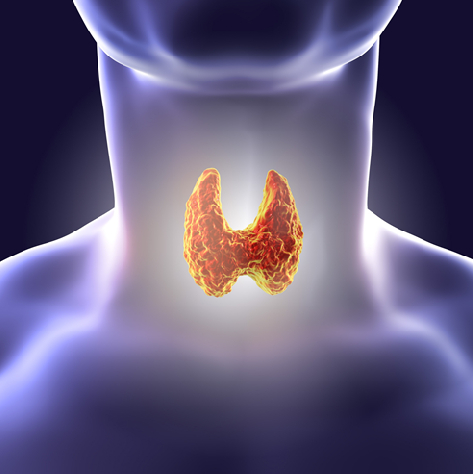Monographs licensed from Therapeutic Research Center, LLC
Alternate names: Acide Triiodothyroacétique, T-cuts, Triac, Triax, Tricana, Triiodothyroacetic Acid
Alternate names: Acide Triiodothyroacétique, T-cuts, Triac, Triax, Tricana, Triiodothyroacetic Acid
Tiratricol is a thyroid hormone that occurs naturally in the body. It can also be made in a lab and taken by mouth under the supervision of a healthcare provider.
Tiratricol can alter thyroid function. It should not be used without medical supervision. In France, tiratricol is a prescription drug. In the US, tiratricol is not legal to include in dietary supplements. The US FDA has warned against the use of products containing tiratricol.
People use tiratricol for thyroid disorders, high cholesterol, and other conditions, but there is no good scientific evidence to support these uses. It may also be unsafe.
When taken by mouth: Tiratricol is possibly safe when used under the supervision of a healthcare provider for specific medical purposes. It can cause side effects such as diarrhea, fatigue, and weakness. Tiratricol is possibly unsafe to use without medical supervision. It can cause serious adverse effects such as rapid heart rate, shakiness, anxiety, and weight loss.
Special Precautions & Warnings:
Pregnancy: Tiratricol is possibly safe when taken by mouth under the supervision of a healthcare provider for the treatment of thyroid problems in the developing infant. Tiratricol is likely unsafe when taken by mouth without medical supervision because it might harm the developing infant's heart.
Breast-feeding: There isn't enough reliable information to know if tiratricol is safe to use when breast-feeding. Stay on the safe side and avoid use.
Diabetes: Tiratricol might interfere with blood sugar control. Doses of medications used to treat diabetes might need to be adjusted. If you have diabetes, speak with a healthcare provider before taking tiratricol.
Heart disease: Taking tiratricol might worsen symptoms of heart disease. Avoid use.
There is interest in using tiratricol for a number of purposes, but there isn't enough reliable information to say whether it might be helpful.
There isn't enough reliable information to know what an appropriate dose of tiratricol might be. Keep in mind that natural products are not always necessarily safe and dosages can be important. Be sure to follow relevant directions on product labels and consult a healthcare professional before using.
Interactions with pharmaceuticals
Cholestyramine (Questran)
Interaction Rating=Moderate Be cautious with this combination.
Cholestyramine might decrease how much tiratricol the body absorbs. This might decrease the effects of tiratricol. To avoid this interaction, take tiratricol at least one hour before or four hours after taking cholestyramine.
Medications for diabetes (Antidiabetes drugs)
Interaction Rating=Moderate Be cautious with this combination.
Tiratricol might lower blood sugar levels. Taking tiratricol along with diabetes medications might cause blood sugar to drop too low. Monitor your blood sugar closely.
Medications that slow blood clotting (Anticoagulant / Antiplatelet drugs)
Interaction Rating=Moderate Be cautious with this combination.
Tiratricol might slow blood clotting. Taking tiratricol along with medications that also slow blood clotting might increase the risk of bruising and bleeding.
Thyroid hormone
Interaction Rating=Major Do not take this combination.
Tiratricol works similarly to thyroid hormones. Taking tiratricol along with thyroid hormone pills might increase the chance of side effects from thyroid hormone.
Interactions with herbs & supplements
Herbs and supplements that might slow blood clotting: Tiratricol might slow blood clotting and increase the risk of bleeding. Taking it with other supplements with similar effects might increase the risk of bleeding in some people. Examples of supplements with this effect include garlic, ginger, ginkgo, nattokinase, and Panax ginseng.
Herbs with thyroid activity: Tiratricol might affect the body's production of thyroid hormone. Taking it with other supplements with similar effects might alter thyroid function too much and cause side effects. Examples of supplements with this effect include bugleweed and lemon balm.
Vitamin K: Taking tiratricol might reduce vitamin K's ability to help blood clot.
There are no known interactions with foods.
vital.ly has licensed monographs from TRC Healthcare.
This monograph was last reviewed on 31/07/2023 10:00:00 and last updated on 18/02/2023 07:50:32. Monographs are reviewed and/or updated multiple times per month and at least once per year.
Natural Medicines disclaims any responsibility related to medical consequences of using any medical product. Effort is made to ensure that the information contained in this monograph is accurate at the time it was published. Consumers and medical professionals who consult this monograph are cautioned that any medical or product related decision is the sole responsibility of the consumer and/or the health care professional. A legal License Agreement sets limitations on downloading, storing, or printing content from this Database. No reproduction of this monograph or any content from this Database is permitted without written permission from the publisher. It is unlawful to download, store, or distribute content from this site.
Natural Medicines rates safety based on scientific evidence according to the following scale: Likely Safe, Possibly Safe, Possibly Unsafe, Likely Unsafe, Unsafe, and Insufficient Evidence to Rate. For more information about Natural Medicines’ Safety Rating System,
click here.
The Natural Medicines Effectiveness Ratings are assigned for specific indications. A product might be rated "Possibly Effective" for one condition, but be rated "Likely Ineffective" for another condition, depending on the evidence. For more info
click here.





